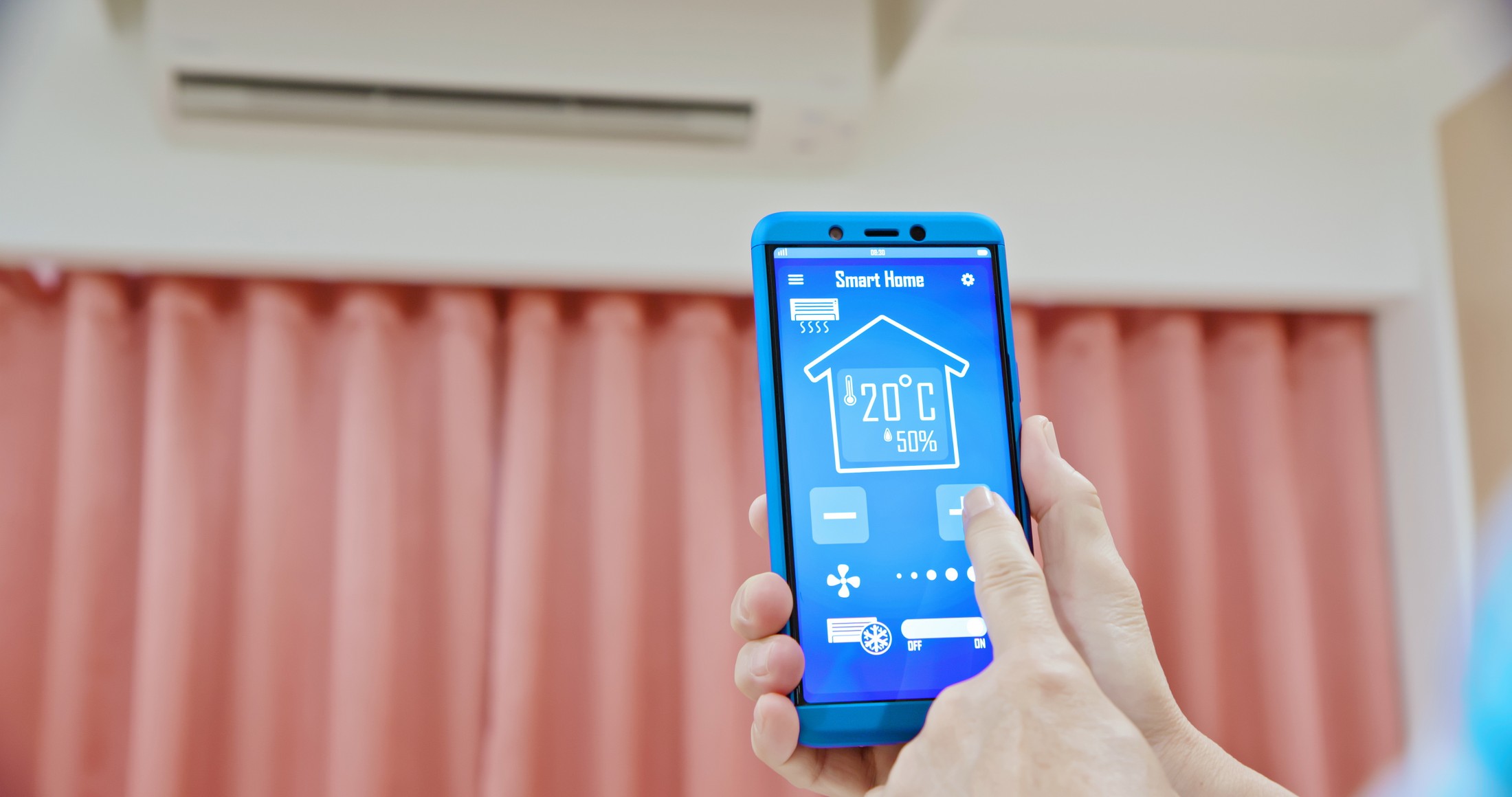
Integrating HVAC systems with home automation technology not only simplifies the management of your home's climate but also significantly enhances its energy efficiency and comfort. For homeowners in Toronto and the Greater Toronto Area (GTA), where weather conditions can vary dramatically, the ability to seamlessly control heating, cooling, and ventilation systems through smart technology is not just a luxury; it's becoming an essential part of achieving an advanced and efficient home environment.
Essentials of Smart HVAC Technology
A smart HVAC system incorporates advanced technology to provide heating, ventilation, and air conditioning services that can be remotely controlled and autonomously adjusted. At its core, a smart HVAC includes a thermostat that can be programmed and adjusted from anywhere using internet-connected devices like smartphones or tablets.
It typically integrates sensors and machine learning capabilities to optimize its functions based on real-time environmental data and learned homeowner preferences. This modern approach to climate control goes beyond mere temperature adjustments, encompassing entire home environment management systems that improve air quality and humidity levels.
The Benefits of Smart HVAC Integration
Integrating smart technology with your HVAC system brings numerous advantages that impact both the comfort of your living space and your wallet:
-
Energy Efficiency and Cost Savings:
Smart HVAC systems are designed to maximize energy use, ensuring that heating and cooling are delivered precisely when and where needed. By adapting to your daily schedule and detecting changes in home occupancy, these systems reduce wasted energy, which can lead to significant reductions in utility bills. The ability to analyze detailed energy usage patterns also allows homeowners to make informed adjustments that align with energy conservation goals. -
Enhanced Comfort through Personalized Settings:
The true intelligence of a smart HVAC system lies in its ability to learn and adapt to the preferences of its users. Whether it’s adjusting the temperature for overnight comfort or ramping up the heat just before you arrive home from work, smart systems ensure your home environment is always set to your preferred comfort level. This personalized approach not only improves overall satisfaction but also contributes to a healthier living environment by maintaining consistent temperature and humidity levels.
Enhancing HVAC Efficiency through Home Automation
Home automation is not just about convenience; it’s a comprehensive approach to enhancing efficiency and functionality in residential settings. This integration enables homeowners to achieve optimal comfort and reliability from their heating, ventilation, and air conditioning units.
Automated Climate Control
Home automation systems play a crucial role in refining the functionality of HVAC units by providing automated climate control. These systems can adjust heating, cooling, and ventilation in real-time based on a variety of environmental inputs.
Temperature sensors, along with humidity and air quality detectors, continuously feed data to the HVAC system, enabling it to maintain optimal climate conditions throughout the home. This dynamic adjustment not only ensures consistent comfort but also helps in maintaining an energy-efficient operation by adapting to both external weather changes and internal heat gains, such as those from appliances or occupancy.
Remote Access and Control
One of the standout features of home automation integrated with HVAC systems is the ability to control settings remotely. Whether you're in bed and wish to adjust the thermostat without getting up, or at work wanting to warm up your house before you return, smartphone apps and voice command technologies make it possible.
This remote capability not only adds a layer of convenience but also allows homeowners to manage their home environments more effectively. By using apps or voice commands via devices like smartphones, tablets, or smart speakers, users can effortlessly change settings, schedule heating or cooling times, or even shut down the system entirely from any location.
Maintenance Alerts and Smart Diagnostics
Smart HVAC systems equipped with home automation technology offer significant advantages in maintenance and longevity of the equipment. These systems are designed to monitor their own performance and condition continuously. By doing so, they can provide proactive maintenance alerts to homeowners and service providers.
For example, if a filter needs changing or if there is a drop in efficiency that might suggest a potential issue, the system can send an alert to your mobile device.
Additionally, smart diagnostics can help in pinpointing problems, often before they become serious, thus enabling preemptive repairs and reducing the likelihood of unexpected breakdowns. This proactive approach not only saves time and money but also extends the lifespan of the HVAC system, ensuring it operates at peak efficiency.
Adapting to Your Lifestyle with Smart HVAC
Smart HVAC systems excel in their ability to adapt to the unique lifestyles and preferences of homeowners. Utilizing advanced algorithms and machine learning, these systems gradually learn from daily interactions and routine settings.
For instance, they can detect the times when the heating is typically turned up or when certain areas of the home are no longer occupied. This data allows the system to anticipate needs and adjust settings automatically to suit individual preferences for comfort and energy efficiency.
Over time, the system refines its understanding, ensuring that the indoor climate is always aligned with the occupants' patterns and preferences, making manual adjustments less necessary.
Scenario-based Settings
The versatility of smart HVAC systems is further exemplified through scenario-based settings, which adjust the environment according to different household scenarios. Here are a few examples:
-
Home vs. Away: Smart HVAC systems can detect whether or not the house is occupied using geofencing technology linked to residents' smartphones. When everyone is away, the system shifts to an energy-saving mode, reducing heating and cooling in unused spaces. Upon detecting a resident's return, it promptly reverts to the preferred comfort settings.
-
Night vs. Day: During the night, when cooler temperatures are generally preferred for sleep, the system can automatically lower the heat or increase air conditioning. Conversely, in the morning, it can warm up the bathroom or kitchen ahead of your usual wake-up time.
-
Special Occasions: If you're hosting a party or a large family dinner, smart HVAC systems can adjust to manage the increased body heat and activity. Settings can be temporarily adjusted to maintain comfort despite the larger number of people and increased activity within the home.
The Future of Home Climate Control
zThe integration of HVAC systems with home automation represents a significant leap forward in how we manage and experience our home environments. The key benefits—energy efficiency, enhanced comfort, and superior convenience—are transforming homes into smarter, more responsive spaces that truly cater to the needs and preferences of their occupants.
Smart HVAC systems learn and adapt to your lifestyle, offering customizable scenario-based settings that anticipate your needs throughout the day. From providing maintenance alerts that help avoid unexpected breakdowns to allowing remote control of your home's climate, these systems not only make it easier to manage your home environment but also contribute to substantial energy savings and a reduced carbon footprint.
For homeowners in Toronto and the GTA, where both weather conditions and urban living demand the most from our heating and cooling systems, upgrading to a smart HVAC system isn't just a luxury—it's an investment in future-proofing your home. Consider taking the step towards a more efficient, comfortable, and convenient living experience. Upgrade your HVAC system to embrace the benefits of home automation and enjoy a greener, happier home environment.
